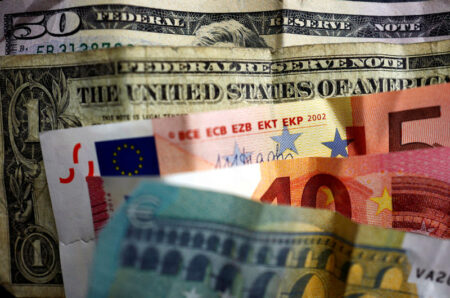Investing.com — Most Asian currencies moved little on Friday, while the dollar held on to recent gains as markets hunkered down before a string of central bank meetings this week, most notably the Federal Reserve.
Signals on more policy support in China did little to aid weak sentiment, with uncertainty over the Fed’s plans for future rate actions keeping investors shy of any risk-driven assets.
The central bank is still widely expected to on Wednesday. But whether it will signal more rate hikes this year remains to be seen, given that U.S. inflation is still trending above the bank’s annual target range.
The dollar steadied in Asian trade, with the and hovering around the 101 mark. Both instruments were trading well above a 15-month low hit earlier in July.
Focus this week is also on a meeting on Thursday, with the bank set to hike rates by 25 basis points.
Japanese yen firms, BOJ in focus
The rose 0.3% on Monday, recovering from steep losses last week as Japan’s top currency minister acknowledged that inflation was running stickier than expected.
But despite this trend, the Bank of Japan has given scant indication that it plans to tighten its ultra-loose policy in the near-term, and is widely and its yield curve control measures this Friday. The Japanese Government also said on Monday that inflation is likely to moderate further this year.
A dovish outlook from the BOJ puts more downward pressure on the yen, with a Fed rate hike this week set to further widen the gap between local and U.S. interest rates.
The rate hike is also expected to weigh on most other Asian currencies, as the gap between risky and low-risk debt narrows.
The fell 0.1%, while the rose 0.3%. The was flat, while the inched up on the prospect of more stimulus measures in China.
Chinese yuan weakens, more stimulus fails to bring cheer
The fell 0.1%, taking little support from a strong midpoint fixing by the People’s Bank of China.
Markets also appeared to be underwhelmed by Beijing’s vow to roll out more measures to support private investment in the country. A notice released on Monday said the government plans to allow private companies into sectors including transport, water, and other infrastructure, and will also release policies to make investing in the country easier.
Chinese officials also vowed to increase liquidity measures after economic growth slowed sharply in the second quarter. But any increases to liquidity are negative for the yuan.
Read the full article here












